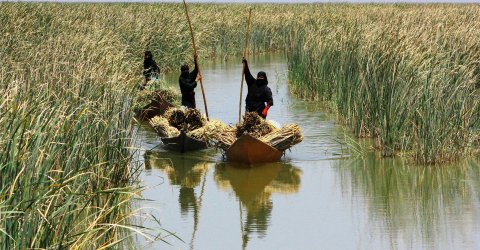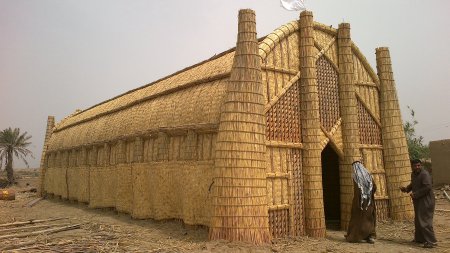
Women and craft industries in the marshes of southern Mesopotamia
Women play an active role in the economic and social life of the marshes of southern Mesopotamia. They shoulder significant responsibilities and play multiple roles. Women as well as men inherited knowledge and skills from the Sumerians, in working with reeds, the dense vegetation that covers vast tracts of these marshes, where it is an important symbol of Iraqi heritage. The women harvest the reeds from the depths of the marshes and transport them in small wooden boats propelled by poles. They are highly skilled in producing reed-mats of various sizes, known locally as "Albaryia" and often participate in building the distinctive reed houses which are considered a masterpiece of architectural heritage dating back more than five thousand years. "Albaryia" are also used in making fences, livestock sheds, pigeon-coops and floor coverings.
It is the women of this area also who produce the handmade local woollen carpets and other fabrics, made with distinctive and beautifully-coloured designs inspired by the wetland environment, featuring palm trees, fish, birds and other animals.
Hand-made clay ovens are used today for baking bread and cooking fish in the same manner as they have been since Sumerian times. The clay itself, along with other component materials such as Papyrus ("Alinvash") are sourced from the wetlands.
Women are traditionally also associated with crafts based on products from palm trees, especially the manufacture of the hand-held fans known as "Almhvh", woven baskets and food from the fruit. The long history of these industries is linked to the fact that the palm tree was regarded as sacred by the Sumerians. Its beauty and bounty led to the Sumerians naming their goddess of fertility, growth and love "Inanna”, or the lady of the palm groves.
The women of the marshes are famous furthermore for producing special products from buffalo milk, such as the local cheese called "Qsaab", which is usually made in the evening to be sold in nearby markets the following morning, and which forms a basic food for the people of the area.
Many of these crafts and traditions have a direct historical link to very ancient Mesopotamian culture and the ever-present marsh environment. Thanks to the women of southern Mesopotamia, these practices remain an enduring part of life there today; and the marshes (parts of which are now included in three separate designated Ramsar Sites) remain the most important wetland environments in modern Iraq.
By Jassim al-Asadi / Nature Iraq (www.natureiraq.org/)
© Image courtesy of Jassim al-Asadi
